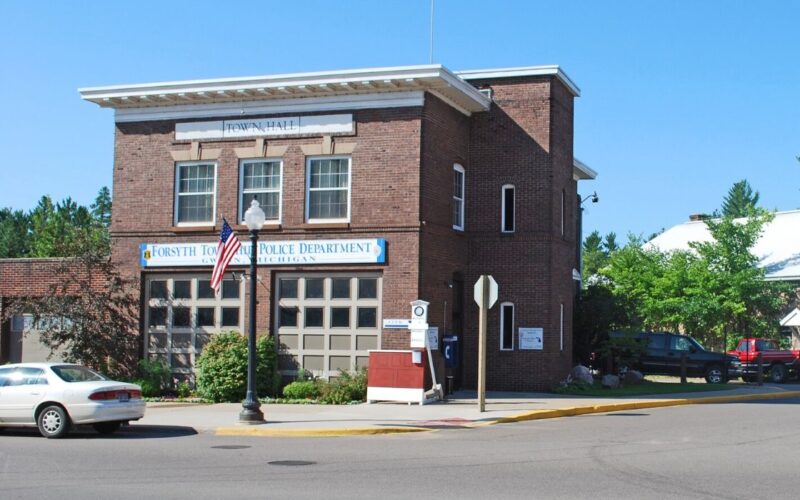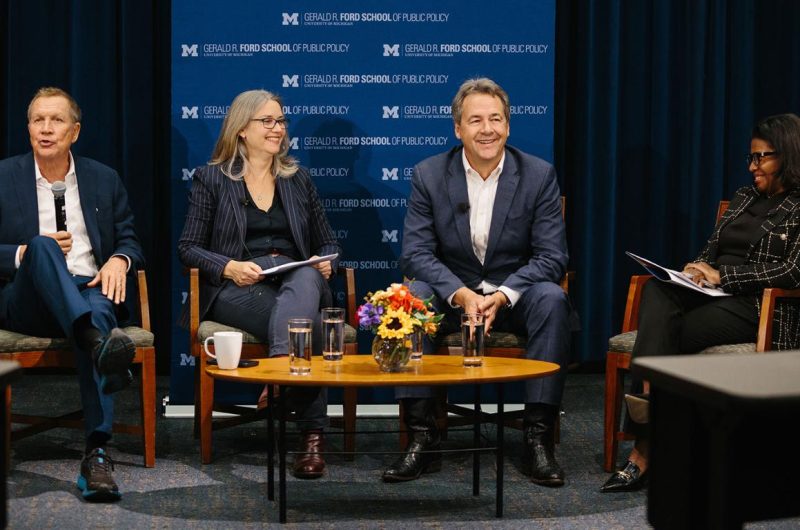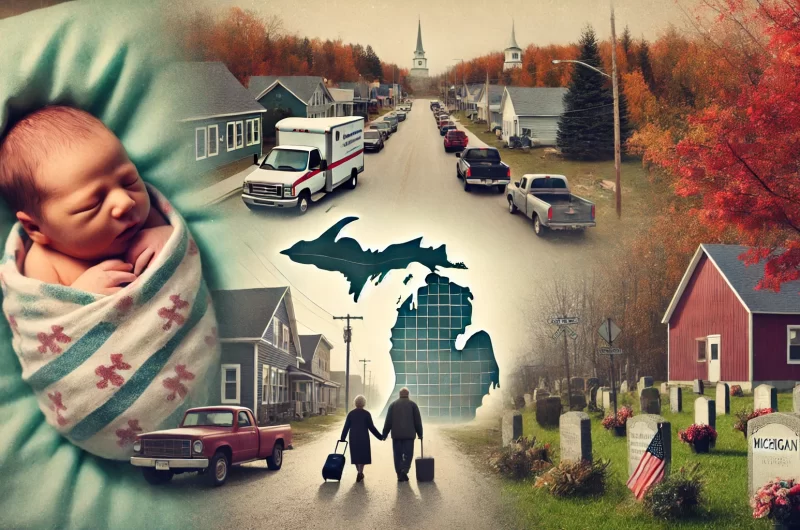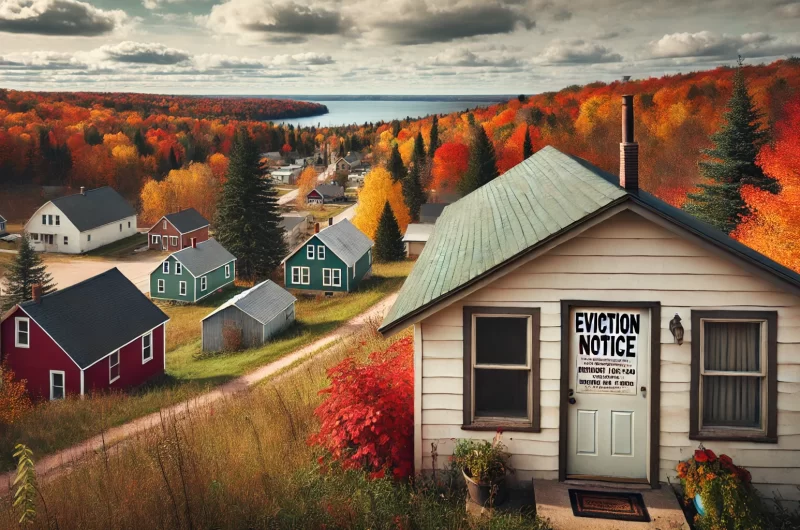What is rural? My experience in the Upper Peninsula of Michigan
The opinions expressed in this publication are those of the authors, and do not necessarily reflect the opinions or views of Rural Insights or its members.

To me, the term “rural” describes a population density and does not necessarily give meaning to the town or city itself. The meaning of rural undoubtedly varies between individuals, and likely depends on regional and geographic factors as well as individual experiences.
For instance, someone who lives in Dearborn, Michigan and vacationed in Michigan’s Upper Peninsula will have a different concept of rural than someone from the same area who has never been to rural Michigan. A person who has lived exclusively in a large metropolitan city on the west coast will have an even different idea of a rural community.
The reality is that those who live in a larger rural area with access to restaurants and shopping, however limited, have different lifestyles compared to those who live in much more geographically-secluded rural areas. There is no one definition or concept of rural that encompasses these variations.
Even though the Upper Peninsula as a whole is considered rural, there is a great deal of heterogeneity within it. This “rural spectrum” varies widely from areas where homes have no neighbors for miles, to farming communities, to micropolitan counties (population 10,000-50,000). In fact, the lifestyles in these areas may be as contrasting as the differences between living in Marquette, Michigan and Chicago. One will see differences in culture, lifestyle, and even religion. Yet by definition, the UP is viewed by most as a homogenous region.
Take my experience, for instance. I grew up in a small town in the UP with a population of 4,000 people, located 25 miles away from the largest UP city, Marquette, which has a population of 20,000 people. In the eyes of many, my town, Marquette, and any other community in the UP are one in the same; however, looking back on my childhood and adolescent years, my experiences growing up were unique.
Adjacent to my community was a large Strategic Air Command Air Force Base whose students attended our local schools. My classmates were children who had lived all over the world and were from all parts of our country. They brought and shared their unique values, cultures, and experiences to our community, and raised the bar for academic competition. Despite being raised in a very small town, I was exposed to incredible diversity and educational opportunity.
This school system was well funded, as educating Air Force children brought substantially increased reimbursement from the federal government. This resulted in me having educational opportunities similar to kids growing up in large cities. It motivated me to learn about other cultures and ways of life very different from my own. It also gave me a longing to travel and experience the world.
The well-funded school system also allowed the liberal arts to be a large part of our education. I was encouraged to play multiple instruments and spent a great deal of time at our local university, which had a bustling theater and music program. Many of my classmates and I took private lessons from music faculty at the university and spent time with music and theater majors. Despite pursuing a degree in science, these experiences inspired me to incorporate the arts substantially into my undergraduate education and life.
Contrast my experience with someone raised in another community of similar size yet not having the influence of a large Air Force Base or close proximity to a larger city. Many of those communities existed throughout the Upper Peninsula. For the most part, these students experienced a completely different cultural upbringing and education. Fortunately today, these communities have access to the Internet, something not available when I was growing up.
Current technology, along with social media, has changed current rural culture compared to the past. While geographical and financial issues impact its access, the content available on the Internet allows everyone, regardless of location, to follow current cultural, educational and entertainment trends…for better or worse!
The Internet has transformed rural communities in other ways as well. While employment opportunities have been limited within the UP, many can now work remotely. This has given many UP students the opportunity to start a career without having to move to a larger area. Being able to work remotely has also allowed many to move from urban areas to the UP. These UP “transplants” have brought cultural diversity to the area , increased our tax base, and their children bring broad and different perspectives to our schools.
I would like to speak specifically to a unique quality of the UP that has always struck me. Despite being rural, it is largely accepting of diversity…race, religion, lifestyle, etc. Ruralism may sometimes be equated with racism, closed mindedness, hatred, and intolerance. I have never found that to be the case, and in fact see quite the opposite.
The UP has been accepting of ethnic minorities, all religions, and political views. Given the population density and relative ethnic homogeneity (mostly Finnish, Italian and German), this is unique.
What are some factors that may explain this? I believe partly our immigration patterns over the past century have had quite an influence. In the early 1900s, UP communities were largely made of cultures that didn’t intermix….Italian Catholics didn’t interact with Finnish Lutherans, for example. In fact, they lived in different areas of small towns and many had their own social clubs. Catholics didn’t marry Lutherans or Methodists. So what is looked at now as a homogenous ethnic population without much diversity, would be considered incredibly diverse to our predecessors only two generations ago!
Our grandparents and parents experienced and lived the intermingling of these groups and embraced each other’s differences. This transformation happened in the relatively-recent past, and I believe is ingrained in the UP collective culture…as second-generation immigrants, it’s natural to be accepting of others.
Again, I feel the term ‘rural’ can only be used to describe a population density. It does not reflect the complexities and variation of the cultures that exist within the rural area itself. Educational, cultural, religious, technological and economic factors all play an important role in differentiating one rural area from another. My experiences growing up in a small rural town have given me a unique understanding of and appreciation for rural communities–so much so that I, like many others, have happily chosen to return to a rural area to work and raise my family.





Hey Greg – This is Stuart, the guy that helped Curtis with your lawn. Great essay. Hope you and your family are safe and well. I am now living in Tangier, Morocco and totally loving it here – amazing culture, amazing weather (70s and sunny with a ever-present cool breeze off the Mediterranean) – cool people. Was planning on a visit to the UP this summer – but doubt that is possible now. Anyway – liked your “rural” perspective – Stuart
You wrote about Finns, Italians, and other (I assume) white people. Did you forget or not know about the large number of indigenous peoples in the U.P.? In the communities of Houghton/Hancock, there were many people of color as well: African American, Thai, Chinese, Korean. I’m not sure about all the countries they came from. I may be overlooking some of them.
Disclosure: I lived in Houghton for eight years. I am “white.”
Mar, 2021
White is not a race. Caucasian is though
Interesting perspective – living near the AFB offered a rich opportunity and a global perspective. I grew up about an hour from there, very tiny town (hamlet really) with about 600 people, about 30 min to Escanaba. As a young kid the only diversity we had was a Native American family, and later a Vietnamese war bride. We had two churches – Catholic and Lutheran – so I figured there were the only 2 religions. Marquette seemed like a big city to me then. I attended university at NMU and loved it, mostly because of the diversity, the greater global viewpoint and cultural opportunities. It was also where I made friends with Detroit inner city kids – that was a huge eye opener!
Living in Houghton brought a lot of cultural diversity with Michigan Tech in town. Our students also get experiences and strong competition due to cultural diversity.
I grew up in Marquette and enjoyed all the things you mentioned. Music was big, playing in bands was a great ‘job’ which put me on a fast track making friends when I moved to Ontonagon to teach after graduating from NMU. I retired in 2018 after 43 years in the trenches and would not want to retire anywhere else. Guess I did the trip you described in reverse.
Hi Greg… My father was from Gwinn and my mother from Princeton… big Italian family… I bet we are related… lol. Great read!
I absolutely loved this. This article is the tapestry of my life. I too come from a very small town in close proximity to Marquette. I am a third generation Yooper of Italian and English heritage. Both sides working in the iron ore mines. After leaving the UP.. living various places as a child, I spent my teen/early adult years downstate in Battle Creek. I ended up back in the UP..in Escanaba where I raised my kids. Best thing I ever did..and at 56 years old I see full circle the beauty of the land, the people, the culture and moral compass they’ve created. Im so blessed to have this extraordinary
place be such a huge part of my life, where Im from and who I am as a result.
GREAT article….very well said!!
Being a newcomer to the U.P., I must contradict many of the statements in this article, especially that Yoopers give a warm welcome to newcomers and welcome diversity. Perhaps this is true in Gwinn and in Marquette (which primarily votes Democratic) but not in the rest of the Upper Peninsula. I have heard “you’re not from around here more times than I can count. One only has to look at the current ethnic makeup of the Upper Peninsula to understand that communities by and large do not embrace diversity. The “good old boy” network is alive and well. Please withhold my name.
Great review I could not have stated it better thank you. I am currently going through the same situation of clan like behavior and unwelcoming to outsiders
I will repeat what was stated above, that you failed to mention the Native American population and the 5 recognized tribes in the UP. Having lived here on and off for my entire life, I will also agree with “withhold my name” that many in the UP do not offer a “warm welcome to newcomers”. The lack of welcome to outsiders though in my opinion has reasons. The area has historically been an extraction boom and bust area, from timber and paper mills to mining. People from “outside” come in make promises make money and then leave, leaving their pollution, and destruction behind. Even the withdrawal of the AFB and some of the prisons followed the same pattern.